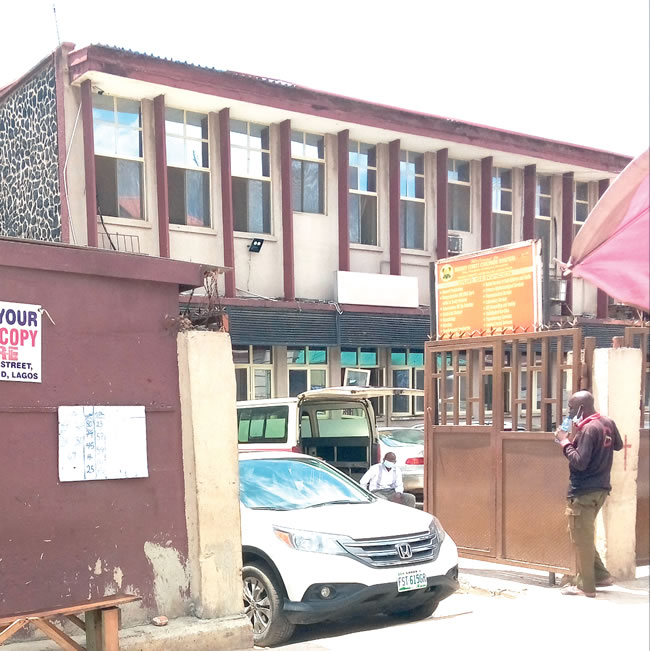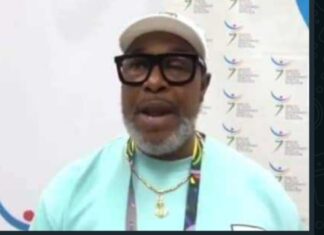- Sapara family seeks posthumous honour for the first medical doctor of Massey Street Children Hospital, Dr. Oguntola Odunbaku Sapara
By Cynthia Sapara
Your excellency sir, it gives me great pleasure to reach out to you on the page of this newspaper to call your attention to the laudable contribution of my great-grandfather, the late Dr. Oguntola Odunbaku Sapara, I.S.C., L.R.C.P., L.R.C.S., (Edin) L.F.P.S., F.R.I.P.H., (Glasgow).
But first, let me pause to appreciate you for the upgrading of the famous “Massey Street Children Hospital”.
On behalf of all Lagosians who still relieve the credibility of that hospital; I say thank you, sir. Such a memorable health facility deserves everything any government can do to ensure that it is kept alive and thriving given the record of how well it had served and still serving humanity, especially mothers and children.
Maternal and child health remain a global priority, of which, Massey Street Children Hospital is largely committed to.
Dr. Oguntola Odunbaku Sapara came back to his Motherland and dedicated his life to transforming maternal and child health that was plunging at the time. Only five out of ten Nigerian babies ever saw their first birthday. His vision, now Massey Street Children Hospital, became a household name.
Dr. Oguntola Odunbaku Sapara was educated at Wesleyan Buxton Memorial Day School; the Government Model School, Wesleyan Boys High School and C.M.S. Grammar School, respectively, in Sierra-Leone. His initial education took place in that country because his own father, Orisha Sapara, was captured on the high seas in 1815 when travelling to the West Indies on a British cruiser. He was then taken into slavery for a number of years. By the time he was rescued along with other captives, they were just able to settle in Sierra-Leone then.
By the time Dr. Sapara was brought back to his state of origin, Lagos in 1876; bearing the name given him by the slave masters, “Alexander Johnson Williams”, he got enrolled into the famous C.M.S. Grammar School, with his peers such as the late Adegboyega Edun, J. H. Samuel and a Dr. Henry Carr O. B. E., I.S.C among others. They passed out in 1877.
One year later on completion of his studies in 1878, he was apprenticed at the Government Printing Office. In 1881, he joined the Colonial Hospital as a Dispenser-in-Training under the late Mr. R.Z. Balley. He served the man till his death in 1883. He was promptly appointed to succeed his boss as Dispenser and Storekeeper till 1885 when he had to return to Gold-Coast on leave. He remained there till 1887 when he also upgraded his medical practice and rose to become a Chemist and Druggist. After three years, he later found his own dispensary in Ghana.
He then proceeded to England same year in 1887 where he was admitted at St. Thomas Hospital, England. There, he worked hard and obtained a Certificate of Honour in Midwifery & Gynaecology. By 1895, at the University of Glasgow, he qualified in L.R.C.P., L.R.C.S. He was later at the University of Edinburgh where he bagged L.F.P.S., F.R.I.P.H and was admitted a Fellow of the Royal Institute of Public Health.
Armed with these laudable qualifications, he returned to his home town, Lagos and was admitted into the then office of the Colonial Surgeon in 1896 as the Assistant Colonial Surgeon. He served efficiently in different stations for about 32 years making diverse contributions to improving public health.
Among his various feats, Dr. Sapara fought for slum clearance, organised a society for scientifically training midwives, organised the first public dispensary in 1901, identified causes of an epidemic of tuberculosis in 1918 that reflected an overcrowding, poor ventilation and public ignorance about hygiene. He was also the Chairman of the Health Week Committee, leading the successful fight against bubonic plague, which struck Lagos in 1924.
In 1898, he got promoted as Medical Officer, Epe. He was later admitted into the Smallpox Cult where he gained further knowledge on the debilitating ailment at that time. In fact, he later fought campaign against secret societies that were spreading smallpox.
The late Dr. Sapara also waged war against “arm to arm” vaccination which he believed was the major cause of syphilis in adults and children in Nigeria back then. The practice was stopped. There were many other lofty ideals he mooted that were all successful.
His great knowledge of people’s health needs endeared him as very invaluable to the government of his day. Quickly, his service to the community was recognised especially with his advocacy for trained midwives because he was keenly interested in child welfare.
To actualise that, he helped the first two midwives in Nigeria to get schooled in England. Then, he began the efforts towards the conversion of old Massey Dispensary into the Massey Street Hospital, declared opened by Governor Graeme Thomson in 1926. That’s how the hospital became famed with him serving most of Lagos.
Then, in honour and appreciation of Dr. Sapara’s services to the health institution, the government named the Southern boundary of the maternity home as “Sapara Avenue” which has long been changed with other names many times over. However, from that time on, he spent 25 years in the services of the maternity home.
In fact, to his honour, the then Private Medical Practitioners and his other professional colleagues later erected a beautiful tablet on the Eastern part of the Massey Street Children Hospital to eulogise their colleague who laboured for the wellbeing of midwives, mothers and children in the state, and by extension, in the country.
Dr. Sapara later took his exit in 1921 after having laid a steady foundation for the continuity of midwifery in the country, especially, at the hospital. Still, in his retirement, he continued his medical activities with unabated interests by offering helping hands in several public health activities.
At one time, he originated the organisation of “Health Week” on which dais, several health issues were deliberated upon to help Lagos State back then. Dr. Sapara then retired from active medical services in 1928.
May I establish the fact that Dr. Sapara was a full Lagosian with his residence on 41, Broad Street, Lagos. He was born on June 9, 1861 and died in June 1935 after years of dutiful service to humanity.
At his burial, notable medical practitioners and young medics bore his coffin slowly and reverently basically to honour the man, whom they described as sparkling medical fire, all in the interest of good health for others, in his lifetime.
The then governor of Lagos State was represented by his then A.D.C, the acting director of Medical and Sanitary Services, Dr. J.W. Thompson and other dignitaries in the field of medicine, as few as they were then; to bid their farewell to the man who brought empathy to their noble profession.
As his great-grandchild, I have been looking at the beautiful edifice the hospital has turned out to be today.
Currently, it is a 56 bedded Neonatal Unit located within two state government-run hospitals on the Lagos Island in the commercial capital of Nigeria.
The unit, according to reports, admits approximately 1500 babies annually. In addition, the hospital unit has nine incubators and 27 cots including seven in the Emergency Room, plus a separate ‘mothers’ room’.
The in-born unit, dubbed ‘Baby Factory’ has 10 incubators, 10 cots and a 4-bedded Kangaroo Mother Care (KMC) room. Then, the unit boasts of two consultant paediatricians (neonatologists), one senior registrar, four registrars and 31 nursing staff. This was a project that was converted from its humble start of Massey Dispensary into Massey Hospital.
Same has over the years metamorphosed into the much-celebrated Massey Street Children Hospital which today vaunts 19 incubators, 24 phototherapy machines (plus facility for sunlight phototherapy) and one Dramedica Bubble CPAP machine; all in one unit.
The purpose of this letter is not just to highlight the achievements of Dr. Sapara, but most importantly and on behalf of the entire Sapara Family in Lagos State, to appeal to you, sir, to please honour my late great-grandfather with the renaming of the century-old transformed health institution as Sapara Massey Street Children Hospital.
The late Dr. Sapara initiated its first transformation which earned him numerous applauds for the ways it had been a bedrock for saving countless lives of mothers and children in Lagos State, and even in Nigeria.
That was the notable foundation for what the same edifice is being transmuted to in your era, now moved to Adeniji-Adele Road, Lagos Island.
Hence, I am appealing that as you build the groundwork; please, kindly recall the good deeds of one Lagosian, indeed, a visionary Nigerian of repute whose dedication paid off just as it is still paying off till date.
Mr. Governor sir, please, build upon the gallant acknowledgements of the likes of the late King George V of the United Kingdom who awarded the late Sapara with the Imperial Service Order with special reference to his smallpox activities in June 1923.
Here in Nigeria, the Owa of Ijeshaland decorated the late Sapara with the insignia of Bashemi, a chieftaincy title, to honour his contributions to medicine early in 1924.
Also, the late James Churchill Vaughan made concerted efforts to organise the fragmentary records of Sapara’s work on traditional medicine. He was able to patent some of Sapara’s discoveries in herbal medicine, which are still marketed today.
As we read, a portrait of the Oloye Sapara by Aina Onabolu hangs in the National Gallery of Modern Art in Lagos.
And just as a reminder, the road behind the hospital was named Sapara Avenue in his memory, if it is still so named due to changes in governments and eras.
It goes without saying that a pioneer like Dr. Sapara should be recognized extensively. Not only does this force us to acknowledge the ground breaking impacts he made, but calls for a change in our approach of telling our history. Dr. Sapara was fundamental in building the healthcare structure in Nigeria.
Therefore, the reconstruction of the paediatric facility, done as a part of your Medical Infrastructure Blueprint strategy and pledge to replace the current Massey Street Children Hospital with a new specialist Children’s Hospital that is spacious and fit for purpose; where countless prominent Lagosians and Nigerians were born and nurtured be named: Sapara Massey Street Children Hospital for the true essence of its very important historical heritage. Death makes no mention to the trailblazer. It is the duty of the living to do so.
Cynthia Sapara writes from Lagos













